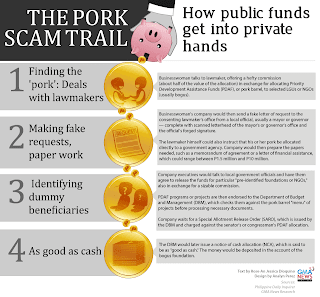'PORK BARREL FUND' SCANDAL: Political elite in Manila will close ranks again to save its own collective skin
"I THINK we have to begin from the recognition that Philippine society today not only has a very high proportion of its people living below the poverty line, it is also probably the most highly unequal society in this part of the world.
"The poor in our country barely have anything to eat; they scour garbage dumps looking for usable trash, live in makeshift shanties along dangerous waterways, beg in the streets -- in the shadow of the most expensive condominium buildings and exclusive housing communities. A social order that imagines this to be normal, and coasts along as if government belonged to its elected officials, is ripe for revolution."
So says Philippine professor, Dr Randy David, after the expose of the latest brazen case of public corruption in the country involving more than ten billion pesos (over half a billion ringgit) of politicians' "pork barrel" funds channeled to fictitious non-governmental organizations. So brazen, in fact, that Manila's Roman Catholic archbishop was moved to tears commenting about it. As a regular visitor to the Philippines, this writer sadly cannot but attest to the grim reality of what David said.
It is often enough a cause to wonder why indeed, if the Philippines is ripe for revolution, it has not happened. Will this latest example of massive official malfeasance cause such public outrage that it becomes the trigger for revolution? I bet not.
The politicians implicated -- and they are some of the country's most powerful senators and other national legislators -- will be hoping the current outrage they generated will, as previously, blow away and be forgotten soon enough. They may again be proven right.
National politics in the Philippines is almost the exclusive preserve of well-known personalities such as movie stars and political dynasties from about two dozen well-to-do families.
Despite popular democracy finding deep and enduring roots on Philippine soil, it is observed more in form than real substance.
The poor masses are too engrossed with barely eking out a living from day to day to be much bothered by politics.
The only time they are mobilized is during elections when campaigning will be treated more as a welcome distraction from the daily grind with free food and perhaps some pocket money exchanged for attending rallies.
Personalities and popular entertainment rather than issues are the stuff of electioneering. Political parties are therefore vehicles for gaining popular support rather than avenues where policy platforms are spelt out and promoted.
Political loyalties are often suspect and it is no accident that Philippine presidents are often elected based on personal popularity and rather effortlessly cobble together comfortable legislative majorities from winning candidates only after elections.
The glue that binds such majorities is always the very pork barrel allocations that have only now been exposed for the elaborate scam that it is. Current Philippine President Benigno Aquino won a big personal mandate in 2010 by tapping into growing popular disgust over mounting massive corruption under his immediate predecessor. But he is very much a product of the system that his late mother Corazon Aquino, from a well-known landed family, restored following the dictatorship of Ferdinand Marcos.
Despite a dogged campaign to hold his predecessor to account, Aquino has shown himself not averse to using presidential budget over-sight to keep legislators in line. How he handles the latest pork-barrel scam will be a stiff political test of his enduring popularity.
He may be caught in a tough bind of placating important legislative allies by not pushing too hard investigations of the scam or retaining his popularity with the people by pursuing official corruption wherever that may lead to. But the Philippines is a famously forgiving nation and there is much speculation the political elite will again close ranks to save its own collective skin.
The masses are by and large clueless and the thin layer that constitutes the Philippine middle class is either too beholden to the ruling elite or else dispersed among the vast Philippine Diaspora spread across the globe that is said to comprise a full ten per cent of the total population.
The Diaspora of highly-skilled professional and relatively well-paid blue-collar Filipinos is thus not just a social but also a political safety valve that may just keep revolution at home at bay.
Source: Philippines lives with corruption - Columnist - New Straits Times - Malaysia












